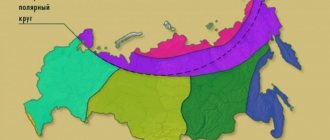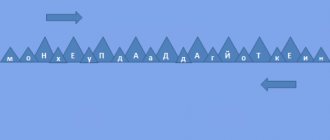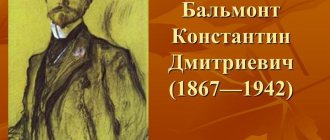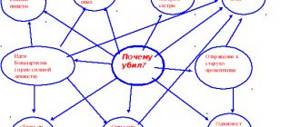Literature lesson for 8th grade “The Captain's Daughter” by A. S. Pushkin. Final lesson"
GBOU secondary school No. 227 SOUODO Moscow
LITERATURE LESSON IN 8TH GRADE
TOPIC: "A. S. Pushkin “The Captain’s Daughter” Final lesson.”
Teacher of Russian language and literature
Ivanchenkova O.B.
Lesson objectives:
1. Summarize observations of the artistic form and language of the novel; summarize the results necessary to create the integrity of the aesthetic impression of the work.
2. Instill episode analysis skills.
3. Strengthen skills:
- read expressively;
- operate with literary terms, cultivating sensitivity to the figurative side of a literary work.
4. Activate the cognitive activity of students, stimulate and develop mental activity.
5. Continue working on speech development: building a detailed answer to the question posed.
Epigraph on the board: Pushkin... wrote “The Captain’s Daughter,” decidedly the best Russian work of the narrative kind. (N.V. Gogol)
Equipment: 1) portraits of A.S. Pushkin (O.A. Kiprensky), Catherine II (Borovikovsky, B. Eriksen), Pugachev (engraving made for the book “The History of the Pugachev Rebellion”);
2) individual tests on the work;
3) materials for analyzing the episode.
Lesson steps:
- Organizing time. Announcing the topic and objectives of the lesson.
- Updating knowledge.
Question: Determine the genre of the work.
From whose perspective is the story told in “The Captain’s Daughter”?
Concluding the story, Pushkin writes: “Here the notes of Pyotr Andreevich Grinev stop... We decided, with the permission of our relatives, to publish it (the manuscript) separately, finding a decent epigraph for each chapter and allowing ourselves to change some of our own names.” The poet calls himself only the publisher of the story.
Question: Do you believe that we have before us the notes of a really living person? (historical truth and fiction)
Why did Pushkin decide to narrate the story not on his own behalf, but on behalf of Grinev?
All events are presented from Grinev’s point of view and bear the imprint of his beliefs. “The Captain's Daughter” is a story of the maturation of the soul, who better than the hero himself to tell about it.
Question: What is an epigraph? Name the epigraph that precedes the entire work. How do you understand it? What did the poet mean when he spoke about honor? Is it only loyalty to the military oath?
3. Individual tests.
4. General conversation.
Question: Name the main characters of the work (2)
Why is the story called “The Captain's Daughter”?
Literary scholars express different opinions on this matter:
— With this name, Pushkin wanted to divert attention from the topic of the Pugachev uprising;
— All the events of the story unfold around Masha and her fate; the heroine is at the center of the plot;
— Masha appears in the story as a bearer of high morality and honor. And the epigraph to the story also applies to her.
Apparently because Masha becomes the center of the lyrical plot. Despite her modesty and inconspicuousness, she becomes the object of love and adoration of everyone who meets her. Because of Masha, Grinev and Shvabrin fight a duel. For her sake, Grinev goes to Pugachev’s headquarters to face certain death; Catherine shows her royal favor. It is Masha who rescues Grinev from prison.
Question: One of the problems in Pushkin’s story is the problem of the role of the people in the development of society. Name other issues raised in the work.
- the problem of love;
- a problem of honor, duty, mercy.
Question: The plot lines in the story relate to these problems.
Task: match the elements of the composition and the elements of the development of the love plot.
A) exposition 1) scene of the duel with Shvabrin, letter from his father.
B) plot 2) release of Grinev, marriage to Masha.
C) climax 3) Petrusha’s childhood on the family estate.
D) denouement 4) Grinev’s acquaintance with Masha Mironova.
Question: Pushkin makes extensive use of folk poetry in The Captain’s Daughter. Most often to create the image of Pugachev. Name these genres of folklore.
- fairy tales (Kalmyk chapter 11);
- songs (epigraphs, chapter 8 - about the gallows);
- proverbs and sayings (Execute like this, execute like this, have mercy like this, have mercy; secret conversation in Chapter 2)
Question: Just be honest. Did the story leave you indifferent? Why is a work about such distant events read with unflagging interest?
The questions that the hero poses and solves do not become obsolete; honor, nobility, love, loyalty - concepts are timeless. The lessons learned by Grinev become our life experience.
5. Analysis of the episode.
A literary work consists of chapters, parts, and episodes. Each of them, even the smallest one, plays an important role in the development of the conflict. Today I'll show you how to analyze an episode.
A) Let's write the plan in a notebook.
B) Let’s reread the scene (Korovina’s textbook p. 203)
C) The test will help you understand this episode; perform tasks A3, A4, A5, A6.
D) We turn to portraits. Question: Which of the portraits is closest to Pushkin’s depiction of Catherine. Explain your answer.
We complete tasks B1, B2, B3, B4, B6.
Episode analysis plan.
1. Place of the episode in the work, the nature of the event depicted, the characters.
2. Characteristics of the characters, their behavior and experiences at the time of the events depicted.
3. “Connection” of the episode with other episodes of the work.
4. The role of the episode in the development of the conflict.
A.S. Pushkin. The story "The Captain's Daughter". Test.
Chapter "Court". “The next day, early in the morning, Marya Ivanovna woke up... Then she eagerly told everything that my reader already knew.”
A1.
The work of A. S. Pushkin correlates with the historical and literary period:
1) late XVIII - early XIX centuries
2) first third of the 19th century
3) mid-19th century
4) second half of the 19th century
A2
. The action of the story "The Captain's Daughter" takes place against the background
1) peasant war led by Stepan Razin
2) history of the Pugachev rebellion
3) preparations for the Decembrist uprising
4) Patriotic War of 1812
A3.
This episode becomes part of determining the fate of Grinev
1) beginning 2) climax
3) lyrical digression 4) denouement
A4.
The “lady” with whom Marya Ivanovna accidentally got into conversation turned out to be
1) Grinev’s mother 2) a random passerby
3) Russian empress 4) wife of the chairman of the court
A5.
Marya Ivanovna came “to ask for mercy, not justice,” because
1) also believes that Grinev is guilty
2) is afraid to contact official authorities
3) justice ruled that Grinev is guilty, and there is no point in appealing to him
4) for the author himself, “mercy for the fallen” is more important than the official decision of justice
A6.
This meeting, fateful for the heroes of the story, takes place
1) in the Belogorsk fortress 2) in Moscow
3) in Orenburg 4) in Tsarskoe Selo
IN 1.
Indicate the name of the hero for whose pardon Masha Mironova wants to “submit a request to the empress.”________
AT 2.
What is the name of the compositional component: “The morning was beautiful, the sun illuminated the tops of the linden trees, which had already turned yellow under the fresh breath of autumn. The wide lake stood motionless. The awakened swans swam pompously from under the bushes that shade the shore”? __________
AT 3.
What is the name of the compositional component that became the means of creating the image of one of the heroines: “She was in a white morning dress, a nightcap and a shower jacket. She seemed to be about forty years old. Her face, plump and rosy, expressed importance and calmness, and her blue eyes and light smile had an inexplicable charm.”_______
AT 4
. What is the name of a means of figurative expression that gives a special emotional coloring: “beautiful morning”, “beautiful meadow”. _________
AT 5.
What is the name of the artistic technique used by A.S. Pushkin, consciously (or unwittingly) reproducing in this fragment of the story the images and motifs of the works of Karamzin, Zhukovsky, etc. ___________________________
AT 6
. Write the name of the literary movement, the style of which A.S. Pushkin parodies in this fragment of the story __________________________
Assignment: try to compose a monologue about this episode, based on the written plan.
This episode is located in the final chapter of the story, entitled “The Trial.” There are two characters in it: Maria Ivanovna and a nice lady walking with her dog in the park. A dialogue takes place between them. The lady, having learned who Masha is, expresses a desire to help her. But her mood changes as soon as she hears Grinev’s name.
(You can draw a parallel between the meeting of Grinev and Pugachev at the inn. The motive of a wonderful patron.)
This episode is the culmination of the hero's fate. For Masha’s sincere story, her conviction that she was right, decided the fate of her beloved. The lady understood her as a woman, as a woman, as a person, as a person. Law gives way to mercy.
The salvation is miraculous: Grinev was “born in a shirt.” (Chapter 1: his mother kept his passport in a box along with his baptismal shirt)
6. Lesson summary.
"Mercy, not justice"
From the point of view of the law, Grinev is guilty: he collaborated with the rebels, and in a strange way was spared and released. Moreover, Grinev did not name the real reasons for his actions in order to preserve Masha’s good name. He was condemned quite fairly, and it is the mercy of the empress that can save him. Masha tells her story to a nice lady she met in the garden. The lady understood her as a woman, as a woman, as a person, as a person. Law gives way to mercy.
Ekaterina utters the phrase: “I am indebted to the daughter of Captain Mironov.” In what debt?
Captain Mironov did not change his oath. Because of this, Masha was left an orphan, and the empress does not leave her without protection. Pugachev once told Grinev: “Debt is worth paying.” Catherine follows this too.
Thus, according to Pushkin’s plan, two emperors show mercy to Grinev - the real one and the impostor, irreconcilable enemies. Before honesty and humanity, the blind and merciless law retreats.
Literary critic T. Alpatova writes: “The Captain's Daughter is the first Russian realistic novel about what could not have happened, and simply could not have happened. A novel about the miracle performed by love." Yes, all this could not have actually happened, most likely, it could not have happened. But Pushkin’s humanistic thought forces the rulers of the world to condescend to the troubles of little people and, bowing before the power of love, do good.
7. Reflection and summing up the lesson.
Questions for the class: What new did we learn today? Which tasks did you like best? What difficulties did you encounter?
Homework: read Pushkin’s prose works “Belkin’s Tales”,
Novel "Arap of Peter the Great"
Grading.




